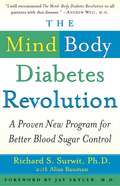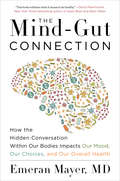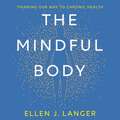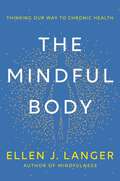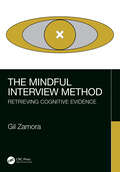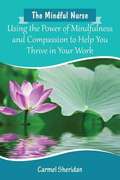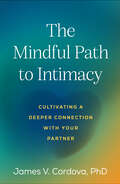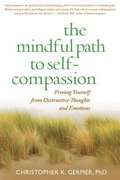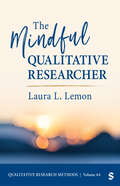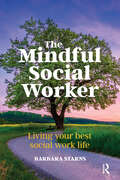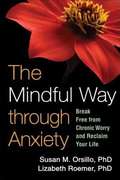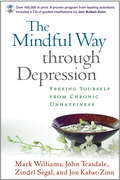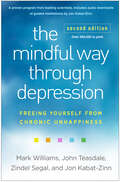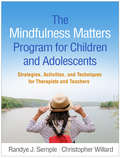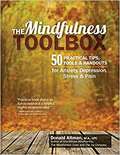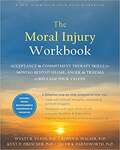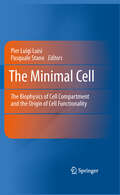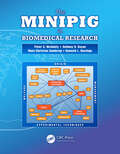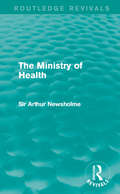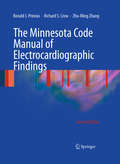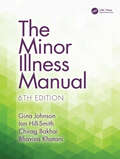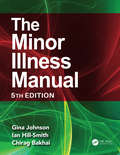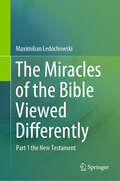- Table View
- List View
The Mind-Body Diabetes Revolution
by Jay Skyler Richard S. Surwit Alisa BaumanThe Mind-Body Diabetes Revolution is the first book to show how stress, depression, and anger affect blood sugar. It's also the first to provide a proven, step-by-step health program to help the millions of people with diabetes manage their disease. Until now, this life-changing program was available only to patients at Duke University Medical Center, but The Mind-Body Diabetes Revolution makes it available to everyone who needs it -- diabetic people and the millions at risk for developing the disease.Over the past forty years, little has changed in the treatment of type 2 diabetes. Diet, exercise, and medication are still the three primary methods used to control blood sugar. Yet diabetes is reaching epidemic proportions not just in the United States, but also in other countries all over the world. Now, after twenty years of research, Dr. Richard S. Surwit -- a leader in the field of the psychology of diabetes -- adds the vital fourth component to treating diabetes: a revolutionary mind-body program that lowers blood sugar levels and dramatically reduces the disease's serious, damaging side effects, which can include painful nerve damage, heart disease, impotence, eye problems, and kidney ailments.The Mind-Body Diabetes Revolution explains how thoughts and beliefs influence a person's emotions and moods and shows how these can translate into chronic anger, cynicism, anxiety, and depression -- all of which increase your blood sugar level. But, with compelling case studies and a powerfully effective step-by-step six-week program, Dr. Surwit demonstrates how you can learn to manage the emotions and stress that lead to elevated hormones and higher blood sugar levels. After he explains the mind-metabolism connection so that you see how it works in your own body, Dr. Surwit provides self-tests and reflective quizzes to test your personality type and decide on the best -- and easiest -- psychological techniques to help you lower your blood sugar level, and keep it low. Then he helps you develop the best long-term mind-body program for your needs and shows how to use the planner to keep track of your progress.An invaluable aid to your overall well-being, The Mind-Body Diabetes Revolution helps you enlist your own mind and body as powerful allies in controlling your diabetes, and enjoy greater general health as a result.
The Mind-Gut Connection: How the Hidden Conversation Within Our Bodies Impacts Our Mood, Our Choices, and Our Overall Health
by Emeran MayerCutting-edge neuroscience combines with the latest discoveries on the human microbiome to inform this practical guide that proves once and for all the inextricable, biological link between mind and body.We have all experienced the connection between our mind and our gut—the decision we made because it “felt right;” the butterflies in our stomach before a big meeting; the anxious stomach rumbling when we’re stressed out. While the dialogue between the gut and the brain has been recognized by ancient healing traditions, including Aryuvedic and Chinese medicine, Western medicine has failed to appreciate the complexity of how the brain, gut, and more recently, the microbiome—the microorganisms that live inside us—communicate with one another. In The Mind-Gut Connection, Dr. Emeran Mayer, Executive Director of the UCLA Center for Neurobiology of Stress, offers a revolutionary look at this developing science, teaching us how to harness the power of the mind-gut connection to take charge of our health.The Mind-Gut Connection, shows how to keep the communication brain-gut communication clear and balanced to:• Heal the gut by focusing on a plant-based diet• Balance the microbiome by consuming fermented foods and probiotics, fasting, and cutting out sugar and processed foods• Promote weight loss by detoxifying and creating a healthy digestion and maximum nutrient absorption• Boost immunity and prevent the onset of neurological diseases such as Parkinson’s and Alzheimer’s• Generate a happier mindset and reduce fatigue, moodiness, anxiety, and depression• Prevent and heal GI disorders such as leaky gut syndrome; food sensitivities and allergies; and IBS; as well as digestive discomfort such as heartburn and bloating• And much more.Supplemental enhancement PDF accompanies the audiobook.
The Mindful Body: Thinking Our Way to Lasting Health
by Ellen LangerBestselling author, and 'mother of mindfulness', Ellen J. Langer makes her long-awaited return sharing her groundbreaking research in The Mindful Body.Have you ever wondered if you could improve your health by harnessing the power of your mind?When it comes to our health, too many of us feel trapped by a medical diagnosis, believing that it can only mean a static or worsening condition. Whether it is stiff knees, frayed nerves or failing eyesight, your mind can lead you to believe things will only get worse. But with practical steps and scientific research you can take control of your mindset, by using your thoughts and perspective to help improve your wellbeing.In The Mindful Body, award-winning social psychologist Ellen J. Langer draws on her lifetime of expertise and trailblazing research by revealing the capacity that mindfulness has to transform our lives. Opening the door to her pioneering Harvard lab, Langer uncovers the secret of how the mind and the body are in fact a single system, and if we embrace the idea of mind-body unity, new possibilities for controlling our health become available to us.Featuring autobiographical anecdotes, iconoclastic philosophy and cutting-edge research, The Mindful Body will help you navigate a path to improved health and wellbeing and in turn boost your cognitive capabilities so that you can take back control of your body for a brighter future.
The Mindful Body: Thinking Our Way to Lasting Health
by Ellen LangerBestselling author, and 'mother of mindfulness', Ellen J. Langer makes her long-awaited return sharing her groundbreaking research in The Mindful Body.Have you ever wondered if you could improve your health by harnessing the power of your mind?When it comes to our health, too many of us feel trapped by a medical diagnosis, believing that it can only mean a static or worsening condition. Whether it is stiff knees, frayed nerves or failing eyesight, your mind can lead you to believe things will only get worse. But with practical steps and scientific research you can take control of your mindset, by using your thoughts and perspective to help improve your wellbeing.In The Mindful Body, award-winning social psychologist Ellen J. Langer draws on her lifetime of expertise and trailblazing research by revealing the capacity that mindfulness has to transform our lives. Opening the door to her pioneering Harvard lab, Langer uncovers the secret of how the mind and the body are in fact a single system, and if we embrace the idea of mind-body unity, new possibilities for controlling our health become available to us.Featuring autobiographical anecdotes, iconoclastic philosophy and cutting-edge research, The Mindful Body will help you navigate a path to improved health and wellbeing and in turn boost your cognitive capabilities so that you can take back control of your body for a brighter future.
The Mindful Interview Method: Retrieving Cognitive Evidence
by Gil ZamoraThe Mindful Interview Method: Retrieving Cognitive Evidence provides investigators with a proven methodology to gather authentic, reliable information from eyewitnesses to help identify potential suspects. The book offers police, and non-law enforcement readers, step-by-step techniques to improve gathering reliable evidence through a "mindful" interview process. The author also provides an assessment component that can measure the reliability of previous interviews performed, and further help to improve the interview process, the skills of the investigator, and thus the reliability of cognitive evidence gathered from future interviews. It is notable that there is minimal to no instruction or training currently offered to those individuals most-often tasked with interviewing an eyewitness about a crime as part of criminal investigations. Despite the lack of training and certification, we allow interviewers to conduct questioning in the face of well-established research as to the malleability of human memory. The assumption is that officials, trained in the rules of evidence, will innately ask the right questions—and in the proper manner—without the proper understanding of the fragility of human memory or the proper training. That assumption is false, and the reality is quite the opposite. In fact, we learn of cases commonplace in the media, that frequently involve questionable interview tactics, misidentifications, and wrongful convictions of innocent people. The Mindful Interview Method uses cognitive research to inform the methods and principles for a mindful approach to gathering only the information the subject remembers. This is the best way to use evidence-based lines of questioning, to perform interviews that elicit the most reliable accounts and information for investigative purposes. Considering current reforms on best practices throughout the criminal justice system, the book provides a path forward for professional interviewers to adopt interview methodologies that guide the practitioner to question anyone in a mindful manner.
The Mindful Nurse: Using the Power of Mindfulness and Compassion to Help you Thrive in your Work,1st ed
by Carmel SheridanNurses work in the foxhole of the healthcare battlefield. Their work is emotionally grueling and physically draining. This easy-to-follow book offers a new skill set to cope with the challenges of nursing and sustain compassion in the long term. Backed by scientific evidence, the book teaches mindfulness and compassion practices to lessen stress, enhance relationships, improve patient care, and reduce patient risk. With a new understanding of everyday mindfulness and compassion, nurses can overcome the myriad contemporary challenges inherent in the workplace—and in their own lives.
The Mindful Path to Intimacy: Cultivating a Deeper Connection with Your Partner
by James V. CordovaLots of couples are comfortable, but are they close? How often do you or your partner binge-watch TV alone at night, instead of cuddling on the couch? And what happened to those meaningful conversations, sharing innermost thoughts? Psychologist James Cordova knows that in a world filled with distractions and busy schedules, many couples struggle to maintain genuine closeness and understanding. In this empathic guide, he reveals how the transformative power of mindfulness can support stronger, more vibrant intimate relationships. We all yearn to feel wholly known and accepted. Through guided exercises, journaling prompts, and heartfelt stories, learn how to be truly present with your partner, resolve conflicts, and connect on a deeper level--both physically and emotionally.
The Mindful Path to Self-Compassion
by Sharon Salzberg Christopher K. Germer"Buck up." "Stop feeling sorry for yourself." "Don't ruin everything." When you are anxious, sad, angry, or lonely, do you hear this self-critical voice? What would happen if, instead of fighting difficult emotions, we accepted them? Over his decades of experience as a therapist and mindfulness meditation practitioner, Dr. Christopher Germer has learned a paradoxical lesson: We all want to avoid pain, but letting it in--and responding compassionately to our own imperfections, without judgment or self-blame--are essential steps on the path to healing. This wise and eloquent book illuminates the power of self-compassion and offers creative, scientifically grounded strategies for putting it into action. You'll master practical techniques for living more fully in the present moment -- especially when hard-to-bear emotions arise -- and for being kind to yourself when you need it the most. Free audio downloads of the meditation exercises are available at the author's website: www.mindfulselfcompassion.org. Association for Behavioral and Cognitive Therapies (ABCT) Self-Help Book of Merit
The Mindful Path to Self-Compassion
by Sharon Salzberg Christopher K. Germer"Buck up." "Stop feeling sorry for yourself." "Don't ruin everything." When you are anxious, sad, angry, or lonely, do you hear this self-critical voice? What would happen if, instead of fighting difficult emotions, we accepted them? Over his decades of experience as a therapist and mindfulness meditation practitioner, Dr. Christopher Germer has learned a paradoxical lesson: We all want to avoid pain, but letting it in--and responding compassionately to our own imperfections, without judgment or self-blame--are essential steps on the path to healing. This wise and eloquent book illuminates the power of self-compassion and offers creative, scientifically grounded strategies for putting it into action. You'll master practical techniques for living more fully in the present moment -- especially when hard-to-bear emotions arise -- and for being kind to yourself when you need it the most. Free audio downloads of the meditation exercises are available at the author's website: www.mindfulselfcompassion.org. Association for Behavioral and Cognitive Therapies (ABCT) Self-Help Book of Merit
The Mindful Qualitative Researcher (Qualitative Research Methods)
by Laura L. LemonThis book explores the ways in which mindfulness can enhance the role of the researcher in qualitative inquiry. Many qualitative method texts discuss honing self-reflexivity, developing awareness, or bracketing pre-existing knowledge. However, few texts provide a tool to learn how to exercise reflexivity, cultivate awareness, or identify biases. This book uses a tangible practice, mindfulness meditation, as a means to train and prepare researchers across disciplines to enter into the field. It is written with the novice researcher in mind, specifically those navigating a graduate program and being introduced to qualitative methods for the first time. Each chapter presents a qualitative method along with a mindfulness practice that stems from the Mindfulness Based Stress Reduction (MBSR) philosophy and training. The reader is encouraged to complete a writing component, Mindful Memos, alongside the practice.
The Mindful Qualitative Researcher (Qualitative Research Methods)
by Laura L. LemonThis book explores the ways in which mindfulness can enhance the role of the researcher in qualitative inquiry. Many qualitative method texts discuss honing self-reflexivity, developing awareness, or bracketing pre-existing knowledge. However, few texts provide a tool to learn how to exercise reflexivity, cultivate awareness, or identify biases. This book uses a tangible practice, mindfulness meditation, as a means to train and prepare researchers across disciplines to enter into the field. It is written with the novice researcher in mind, specifically those navigating a graduate program and being introduced to qualitative methods for the first time. Each chapter presents a qualitative method along with a mindfulness practice that stems from the Mindfulness Based Stress Reduction (MBSR) philosophy and training. The reader is encouraged to complete a writing component, Mindful Memos, alongside the practice.
The Mindful Social Worker: Living your best social work life
by Barbara StarnsMindfulness and social work values go hand in hand and this book is the perfect guide in self-care for social workers who want to incorporate mindfulness into their working lives to positive effect. Looking after your mental health in your working life is so important so that you can do the best job you can and learning mindfulness is a great way to incorporate this.Studies have suggested that mindful social workers can have greater emotional awareness with less emotional reactivity, develop stronger interpersonal skills, and other valuable skills that are important for a relationship-based practice. The Mindful Social Worker gives the reader mindfulness guidance to not only improve themselves but also see how this can have an impact on their work.In this book, the reader will be provided with practice tools such as meditation and relaxation techniques to help the practitioner to be more present and have a stronger propensity to reflection. Case study reflection and self-assessments are also used in this book to enable any practitioner from students and the newly qualified to the experienced social worker or care professional. This is all done within the framework of professional standards for Social Work education and practice, showing how much mindfulness can relate to the social work profession.
The Mindful Way through Anxiety
by Zindel V. Segal Lizabeth Roemer Susan M. OrsilloYou can't just "get over" anxiety. In fact, the very things most people do to try to feel better--avoiding feared situations, pushing worry out of mind--only make the problem worse. Leading psychologists Susan M. Orsillo and Lizabeth Roemer present a powerful new alternative that can help you break free of anxiety by fundamentally changing how you relate to it. With clarity and compassion, this book describes clinically tested mindfulness practices specifically tailored for anxiety in its many forms. Learn step-by-step strategies for gaining awareness of anxious feelings without letting them escalate; loosening the grip of worry and fear; and achieving a new level of emotional and physical well-being. Free audio downloads of mindfulness exercises plus other resources are available at the authors' website, www.mindfulwaythroughanxietybook.com. Association for Behavioral and Cognitive Therapies (ABCT) Self-Help Book of Merit
The Mindful Way through Depression
by Jon Kabat-Zinn Zindel V. Segal John D. Teasdale J. Mark WilliamsIf you've ever struggled with depression, take heart. Mindfulness, a simple yet powerful way of paying attention to your most difficult emotions and life experiences, can help you break the cycle of chronic unhappiness once and for all. In The Mindful Way through Depression, four uniquely qualified experts explain why our usual attempts to "think" our way out of a bad mood or just "snap out of it" lead us deeper into the downward spiral. Through insightful lessons drawn from both Eastern meditative traditions and cognitive therapy, they demonstrate how to sidestep the mental habits that lead to despair, including rumination and self-blame, so you can face life's challenges with greater resilience. This e-book includes an audio program of guided meditations, narrated by Jon Kabat-Zinn, for purchasers to stream or download from the Web. See also the authors' Mindful Way Workbook, which provides step-by-step guidance for building your mindfulness practice in 8 weeks. Plus, mental health professionals, see also the authors' bestselling therapy guide: Mindfulness-Based Cognitive Therapy for Depression, Second Edition. Association for Behavioral and Cognitive Therapies (ABCT) Self-Help Book of Merit
The Mindful Way through Depression: Freeing Yourself from Chronic Unhappiness
by Jon Kabat-Zinn Zindel Segal Mark Williams John TeasdaleThe revolutionary book that has helped hundreds of thousands of readers find relief from chronic unhappiness is now in a revised and updated second edition. This authoritative, easy-to-use self-help program is grounded in mindfulness-based cognitive therapy, a clinically proven approach. The expert authors explain why our usual attempts to "fix" sadness or "just stop thinking about it" can actually worsen depression, instead of relieving it. Through vivid stories and downloadable audio meditations encouragingly narrated by Jon Kabat-Zinn, the book shows how you can break the mental habits that lead to despair--and recover a sense of joy, aliveness, and possibility. Revised throughout to be even more reader friendly, the second edition features fresh insights on coping with the challenges of our ever-changing world, the latest scientific data, and four additional audio tracks. See also the authors' Mindful Way Workbook, which provides step-by-step guidance for building your mindfulness practice in 8 weeks. Plus, mental health professionals, see also the authors' bestselling therapy guide: Mindfulness-Based Cognitive Therapy for Depression, Second Edition.
The Mindfulness Matters Program for Children and Adolescents: Strategies, Activities, and Techniques for Therapists and Teachers
by Christopher Willard Randye J. SempleThis indispensable resource provides a flexible framework and a wealth of engaging tools for teaching mindfulness to children and adolescents with varying needs in school or clinical settings. Numerous kid-friendly mindfulness practices are presented, complete with step-by-step instructions, sample scripts, suggested variations, and discussion questions. The benefits of mindfulness for enhancing children's social–emotional competencies are clearly explained. Clinicians and teachers are guided to select and sequence activities for groups struggling with specific challenges: stress and anxiety, depression, attention problems, behavioral and emotion regulation issues, and trauma. In a convenient large-size format, the book includes 14 reproducible handouts. Purchasers get access to a Web page where they can download and print the reproducible materials.
The Mindfulness Toolbox: 50 Practical Mindfulness Tips, Tools, And Handouts For Anxiety, Depression, Stress, and Pain
by Donald AltmanA Complete Guide to Mindfulness Tools for Clinicians At last, an authoritative book filled with mindfulness tools that deliver an essential set of engaging, practical strategies along with key research and evidence-based information. The awareness boosting methods in this guidebook offer participants a means of reappraising and observing negative and anxious thoughts, habits, pain, and stress in fresh ways that produce new insight, positive change, and a sense of hope. Featuring over 40 easy to use, reproducible handouts and expertly crafted, guided scripts-such as working with the breath, overcoming depression with here and now pleasantness, calming the anxious mind with sense grounding, expanding a client's strength narrative, the stress pause S-T-O-P technique, and meditations for peace, acceptance, and re-envisioning pain-this book is ideal for clinicians wanting to integrate mindfulness into their work.
The Mindfulness and Acceptance Workbook for Moral Injury: Acceptance and Commitment Therapy Skills for Moving Beyond Shame, Anger, and Trauma to Reclaim Your Values
by Robyn D. Walser Wyatt R. Evans Kent D. Drescher Jacob K. FarnsworthOn the front line of the COVID-19 response are thousands of healthcare providers working in strained systems with limited resources. Difficult decisions will be part of the experience of working under these circumstances. The moral dilemmas that providers may face in this crisis will undoubtedly lead to moral distress and emotional pain. <p><p> Providers may have to make decisions about life and death, determining who gets life-saving equipment and attention and who does not. Working long and stressful hours may lead to accidental mistakes, oversights, or inaction. Providers working in overburdened or under-resourced systems may experience a sense of being thwarted in their effort to keep their oath and live their values. For providers who hold values such as service, caring, or protection, these potentially morally injurious events may have lasting consequences. Anger, guilt, and shame may plague those suffering from these seemingly impossible situations. If providers become mired in this moral pain, they may find their personal and professional lives become increasingly burdened by moral injury. <p><p> The Moral Injury Workbook was developed to facilitate healing for people who have experienced a variety of moral violations and addresses a wide range of moral emotions—from guilt and shame to contempt and anger. It offers a step-by-step program to help readers move beyond their moral pain, reconnect with a fuller sense of self, and re-engage with deeply held values. <p><p> This workbook is a lifeline for healthcare providers in the midst of moral pain. Oriented toward and guided by values of caring and compassion, the content of this workbook may be meaningfully applied to and engaged in the personal and professional practices of all who read it. The six core processes of acceptance and commitment therapy (ACT) are broadly addressed in the workbook to apply to a range of moral injuries.
The Minimal Cell
by Pier Luigi Luisi Pasquale StanoIn the last ten years there has been a considerable increase of interest on the notion of the minimal cell. With this term we usually mean a cell-like structure containing the minimal and sufficient number of components to be defined as alive, or at least capable of displaying some of the fundamental functions of a living cell. In fact, when we look at extant living cells we realize that thousands of molecules are organized spatially and functionally in order to realize what we call cellular life. This fact elicits the question whether such huge complexity is a necessary condition for life, or a simpler molecular system can also be defined as alive. Obviously, the concept of minimal cell encompasses entire families of cells, from totally synthetic cells, to semi-synthetic ones, to primitive cell models, to simple biomimetic cellular systems. Typically, in the experimental approach to the construction of minimal the main ingredient is the compartment. Lipid vesicles (liposomes) are used to host simple and complex molecular transformations, from single or multiple enzymic reactions, to polymerase chain reactions, to gene expression. Today this research is seen as part of the broader scenario of synthetic biology but it is rooted in origins of life studies, because the construction of a minimal cell might provide biophysical insights into the origins of primitive cells, and the emergence of life on earth. The volume provides an overview of physical, biochemical and functional studies on minimal cells, with emphasis to experimental approaches. 15 International experts report on their innovative contributions to the construction of minimal cells.
The Minipig in Biomedical Research
by Kenneth L. Hastings Anthony D. Dayan Peter A. McAnulty Niels-Christian GanderupThe Minipig in Biomedical Research is a comprehensive resource for research scientists on the potential and use of the minipig in basic and applied biomedical research, and the development of drugs and chemicals. Written by acknowledged experts in the field, and drawing on the authors' global contacts and experience with regulatory authorities and
The Ministry of Health (Routledge Revivals)
by Sir Arthur NewsholmeFirst published in 1925, this book explores public health and its administration. It looks at both local and central health administration and surveys the various departments including The Board of Education and The Home Office. The book discusses motives, principles, and results of reform in the sector and gives a history of public health services. Other chapters include those on public health as a career, poor law and public health administration, and health insurance.
The Minnesota Code Manual of Electrocardiographic Findings
by Ronald J. Prineas Richard S. Crow Zhu-Ming ZhangThis book provides quantitative validated rules for evaluating serial ECG change. Just as the original Minnesota Code uses specified measurement rules to reduce coding variability and a systematic code to indicate these measurements, serial comparison uses a set of measurement rules and a systematic code to document categories of ECG pattern changes. These criteria classify ECG change as "No change", significant increase or significant decrease in specific waveform characteristics. Unlike clinical ECG comparison this procedure provides change criteria independent of clinical judgement that have also been validated for their prognostic significance for cardiac endpoints. Updated to reflect changes in understanding over the last 20 years, this title provides the benchmark for coding in electrocardiographic applications.
The Minor Illness Manual: 5th Edition
by Gina Johnson Ian Hill-Smith Chirag Bakhai Bhavina KhataniThis sixth edition of the best-selling The Minor Illness Manual has been completely revised and updated to include the latest clinical guidance and prescribing information, with a reworked introductory chapter reflecting the changing demands of primary care and a new chapter added on COVID-19 and pandemics.The simple, clear and easy-to-use format gives primary care professionals – including doctors, nurses, pharmacists, physician associates and paramedics – speedy access to evidence-based guidance for dealing quickly and appropriately with the wide-ranging situations they are likely to encounter in their daily practice.
The Minor Illness Manual: 5th Edition
by Gina Johnson Ian Hill-Smith Chirag BakhaiThis new edition of the best-selling Minor Illness Manual has been completely revised and updated with the latest clinical guidance and prescribing information, and includes a new chapter on the changing demands of Primary Care. The simple, clear and easy-to-use format enables Primary Care professionals – such as nurses, pharmacists, midwives, doctors, and paramedics – to quickly access the current procedures for dealing with situations they are likely to encounter in their daily practice.
The Miracles of the Bible Viewed Differently: Part 1 the New Testament
by Maximilian LedochowskiDid Jesus Christ really rise from the dead, or did the lance thrust accidentally save his life? Did the Mother of God become virgin with child, or did a mistranslation turn the “young woman” into the “virgin” Mary? How could Jesus walk on water, and is there an explanation for the miraculous multiplication of bread? Is it possible that the blind, the mute, the paralysed or the lepers are suddenly healed? Why do we like to believe in miracles so much? How do miracles come about in the first place? The physician Dr. Maximilian Ledochowski gets to the bottom of these and many other questions and tries to explain the miracles of the Bible with modern knowledge.
